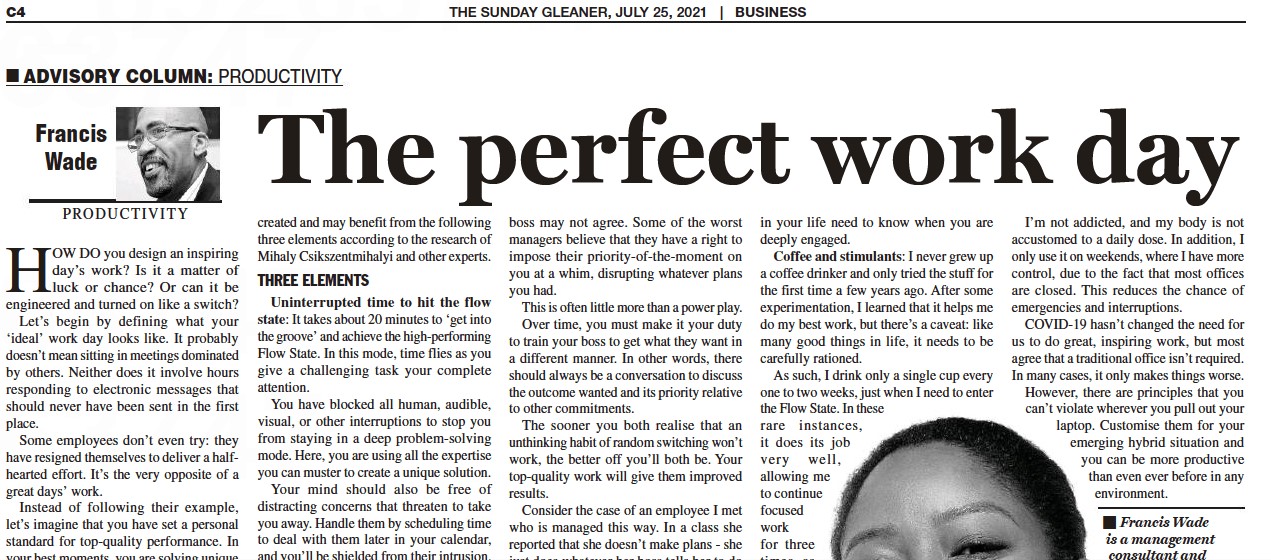How do you design an inspiring day’s work? Is it a matter of luck, or chance? Or can it be engineered and turned on like a switch?
Let’s begin by defining what your “ideal” work day looks like. It probably doesn’t mean sitting in meetings dominated by others. Neither does it involve hours responding to electronic messages that should never have been sent in the first place.
Some employees don’t even try: they have resigned themselves to deliver a half-hearted effort. It’s the very opposite of a great days’ work.
Instead of following their example, let’s imagine that you have set a personal standard for top quality performance. In your best moments, you are solving unique problems using your finest abilities.
However, you can’t be successful without committing a major portion of your attention. In peak episodes, you tackle challenges which cannot be solved while watching television, or browsing YouTube.
But the structure of the modern office does not lend you much help, and this carries over to working from home. As such, these miracle days need to be consciously created, and may benefit from the following three elements according to the research of Mihaly Csikszentmihalyi and other experts.
- Uninterrupted Time to Hit the Flow State
It takes about 20 minutes to “get into the groove” and achieve the high-performing Flow State. In this mode, time flies as you give a challenging task your complete attention.
You have blocked all human, audible, visual or other interruptions to stop you from staying in a deep problem-solving mode. Here, you are using all the expertise you can muster to create a unique solution.
Your mind should also be free of distracting concerns that threaten to take you away. Handle them by scheduling time to deal with them later in your calendar and you’ll be shielded from their intrusion.
Given the priority nature of this work, your time in the Flow State must be pre-scheduled. This protects it against other activities which may crop up.
- Condition Your Environment
Unfortunately, your boss may not agree. Some of the worst managers believe they have a right to impose their priority-of-the-moment on you at a whim, disrupting whatever plans you had.
This is often little more than a power play.
Over time, you must make it your duty to train your boss to get what he/she wants in a different manner. In other words, there should always be a conversation to discuss the outcome wanted and its priority relative to other commitments.
The sooner you both realize that an unthinking habit of random switching won’t work, the better off you’ll both be. Your top quality work will give him/her improved results.
Consider the case of an employee I met who is managed this way. In a class she reported that she doesn’t make plans – she just does whatever her boss tells her to do that day. She arrives at work each morning as a blank slate.
Unfortunately, this kind of staff member is the first to be fired when budgets are cut. Why? She brings nothing unique or distinctive to the workplace, and learns little over time. Anyone can replace her.
If you work from home, you must be even more careful, as you should also turn off disruptive technologies and train family members to leave you alone when you’re doing your best work. But the principle remains the same. People in your life need to know when you are deeply engaged.
- Coffee and Stimulants
I never grew up a coffee drinker and only tried the stuff for the first time a few years ago. After some experimentation, I learned that it helps me do my best work, but there’s a caveat: like many good things in life, it needs to be carefully rationed.
As such, I drink only a single cup every one to two weeks, just when I need to enter the Flow State. In these rare instances, it does its job very well, allowing me to continue focused work for three times as long.
I’m not addicted, and my body is not accustomed to a daily dose. In addition, I only use it on weekends where I have more control, due to the fact that most offices are closed. This reduces the chance of emergencies and interruptions.
COVID-19 hasn’t changed the need for us to do great, inspiring work, but most agree that a traditional office isn’t required. In many cases, it only makes things worse.
However, there are principles which you can’t violate wherever you pull out your laptop. Customize them for your emerging hybrid situation and you can be more productive than even ever before in any environment.
Francis Wade is the author of Perfect Time-Based Productivity, a keynote speaker and a management consultant. To search prior columns on productivity, strategy, engagement and business processes, send email to columns@fwconsulting.com

